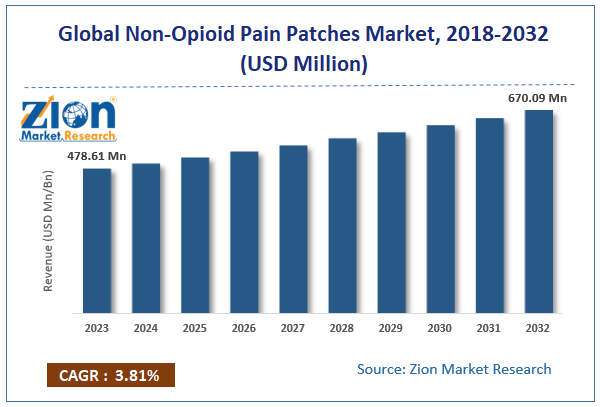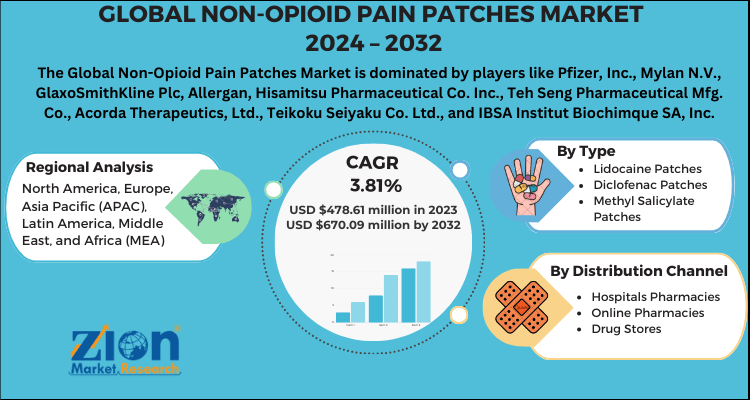Non-Opioid Pain Patches Market Size, Share, Trends, Growth, Analysis, Forecast 2032

Non-Opioid Pain Patches Market by Type (Lidocaine Patches, Diclofenac Patches, Methyl Salicylate Patches, Capsaicin Patches, Ketoprofen Patches, and Others), and by Distribution Channel (Hospitals Pharmacies, Online Pharmacies, Drug Stores, and Others), and By Region: Global Industry Perspective, Comprehensive Analysis and Forecast, 2024-2032
| Market Size in 2023 | Market Forecast in 2032 | CAGR (in %) | Base Year |
|---|---|---|---|
| USD 478.61 Million | USD 670.09 Million | 3.81% | 2023 |
Global Non-Opioid Pain Patches Market Size: Overview
According to the report, global demand for non-opioid pain patches market was valued at approximately USD 478.61 million in 2023, and is expected to generate revenue of USD 670.09 million by the end of 2032, growing at a CAGR of 3.81% between 2024 and 2032.
The report covers forecast and analysis for the global non-opioid pain patches market. The study provides historic data from 2018 to 2022 along with forecast from 2024 to 2032 based on revenue (USD Million). In-depth secondary research is used to ascertain overall market size, top industry players, top product, industry associations, etc. Macro-economic indicators such as healthcare industry outlook, healthcare spending, research funding, GDP along with company websites, company annual reports, white papers, financial reports and other sources have also been considered to arrive at the indicated market numbers.
Non-opioid medications are antipyretic, analgesic, and anti-inflammatory in nature. These medications help decrease the development of pain in the peripheral nervous system by releasing the enzyme cyclooxygenase at the site of injury, which in turn blocks the production of prostaglandins. As per the stats provided by the United Nations Office on Drugs and Crime, almost 25 to 35 million people were abused by opioid globally. Due to rise in the rate of severe side-effects and addiction related to the prolonged use of opioid medication there has been an increased demand for the use of non-opioid therapeutics globally.
Drivers
Increasing Prevalence of Osteoarthritis
The global rise in osteoarthritis prevalence is driving a growing demand for non-opioid pain treatment patches. Several key factors contribute to this trend:
-
Ageing Population: The incidence of osteoarthritis increases significantly with age. As the global population continues to age, there is a higher need for effective pain management solutions for older adults.
-
Joint Injuries: Osteoarthritis often develops following joint injuries from accidents, sports, or repetitive stress. Individuals with joint injuries require effective, non-invasive pain management options.
-
Obesity: Excess weight places additional stress on weight-bearing joints like the knees and hips, heightening the risk of osteoarthritis. With global obesity rates on the rise, more people are susceptible to this condition.
-
Repeated Stress on Joints: Occupations and activities involving repetitive joint movements or overuse can lead to osteoarthritis, underscoring the need for accessible pain management solutions for those in physically demanding jobs.
-
Genetics: A genetic predisposition can make some individuals more likely to develop osteoarthritis.
-
Metabolic Illnesses: Conditions such as diabetes and hyperlipidemia can contribute to osteoarthritis, highlighting the importance of effective pain management for patients with these comorbidities.
-
Bone Abnormalities: Congenital or acquired bone deformities can increase the risk of developing osteoarthritis, necessitating specialized pain management solutions.
Osteoarthritis is the most common type of arthritis, primarily affecting the knees, hips, and hands. These joints are essential for daily mobility and function, making effective pain management crucial for maintaining quality of life. The increasing prevalence of osteoarthritis is thus fueling the demand for non-opioid pain treatment patches, providing a safe and effective means of managing the chronic pain associated with this condition.
Non-Opioid Pain Patches Market Size: Report Scope
| Report Attributes | Report Details |
|---|---|
| Report Name | Non-Opioid Pain Patches Market Size Report |
| Market Size in 2018 | USD 478.61 Million |
| Market Forecast in 2026 | USD 670.09 Million |
| Growth Rate | CAGR of 3.81% |
| Number of Pages | 192 |
| Forecast Units | Value (USD Billion), and Volume (Units) |
| Key Companies Covered | Pfizer, Inc., Mylan N.V., GlaxoSmithKline Plc, Allergan, Hisamitsu Pharmaceutical Co. Inc., Teh Seng Pharmaceutical Mfg. Co., Acorda Therapeutics, Ltd., Teikoku Seiyaku Co. Ltd., and IBSA Institut Biochimque SA, Inc. |
| Segments Covered | By Type, By Distribution Channel And By Region. |
| Base Year | 2023 |
| Historical Year | 2018 to 2022 |
| Forecast Year | 2024 - 2032 |
| Customization Scope | Avail customized purchase options to meet your exact research needs. Request For Customization |
Global Non-Opioid Pain Patches Market Size: Segmentation
The study provides a decisive view on the non-opioid pain patches market by segmenting the market based on type, distribution channel, and regions. All the segments have been analyzed based on present and future trends and the market is estimated from 2024 to 2032. Based on type the market is segmented into diclofenac patches, lidocaine patches, methyl salicylate patches, ketoprofen patches, capsaicin patches, and others. Lidocaine patches accounted for major share of the market in 2023 due to its proven efficacy and safety profile. These patches have are also recommended as first-line of therapy for treatment of neuropathic pain in elderly patients as well as those suffering from shingles.
Global Non-Opioid Pain Patches Market Size: Regional Analysis
Based on distribution channel the market is segmented into hospitals pharmacies, online pharmacies, drug stores, and others. Hospitals segment held major share of the market in 2023 due to frequent patient admissions and visits to the hospital for pain management, especially those suffering from musculoskeletal disorders and other diseases which cause chronic and acute pain. Besides, long-term use of painkillers brings risk of medication related adverse effects which are not the case in patches. Hence, physicians usually prescribe patches instead of oral drugs. Regional segmentation includes the current and forecast demand for Asia Pacific, North America, Latin America, Europe, and Middle East & Africa with its further bifurcation into major countries.
The study also includes drivers and restraints for the non-opioid pain patches along with the impact they have on the demand over the forecast period. Besides, the report includes the study of opportunities and trends available in the non-opioid pain patches market on global level. Pain and disorders related to it are growing rapidly due to lifestyle changes, lack of physical activity, and rising number of surgical procedures. As per the U.S. Department of HHS (Health and Human Services) acute and chronic pain affects most of the Americans than cancer, diabetes, and heart related diseases combined. HHS has also reported that pain is one of the most common causes for visits of patients to healthcare facilities, which makes it the foremost cause of disability, thus contributing largely to the healthcare costs. These factors are leading to the discovery of effective and safe management options like non-opioid pain patches, which is boosting the market growth for these patches globally.
Global Non-Opioid Pain Patches Market Size: Competitive Players
The report also provides company market share analysis in order to give a broader view of the key players in the market. Industry insights and information is delivered in the required format. ZMR develops a list of industry players (manufacturers), distributors, retailers and industry experts. Some of the players included in non-opioid pain patches market are:
- Pfizer
- Mylan N.V.
- GlaxoSmithKline Plc
- Allergan
- Hisamitsu Pharmaceutical Co. Inc.
- Teh Seng Pharmaceutical Mfg. Co.
- Acorda Therapeutics
- Teikoku Seiyaku Co. Ltd.
- IBSA Institut Biochimque SA
The report segments the non-opioid pain patches market as follows:
Global Non-Opioid Pain Patches Market: Type Segment Analysis
- Lidocaine Patches
- Diclofenac Patches
- Methyl Salicylate Patches
- Capsaicin Patches
- Ketoprofen Patches
- Others
Global Non-Opioid Pain Patches Market: Distribution Channel Segment Analysis
- Hospitals Pharmacies
- Online Pharmacies
- Drug Stores
- Others
Global Non-Opioid Pain Patches Market: Regional Segment Analysis
- North America
- U.S.
- Europe
- UK
- France
- Germany
- Asia Pacific
- China
- Japan
- India
- Latin America
- Brazil
- Middle East and Africa
Table Of Content
Methodology
RelatedNews
HappyClients
Zion Market Research
Tel: +1 (302) 444-0166
USA/Canada Toll Free No.+1 (855) 465-4651
3rd Floor,
Mrunal Paradise, Opp Maharaja Hotel,
Pimple Gurav, Pune 411061,
Maharashtra, India
Phone No +91 7768 006 007, +91 7768 006 008
US OFFICE NO +1 (302) 444-0166
US/CAN TOLL FREE +1 (855) 465-4651
Email: sales@zionmarketresearch.com
We have secured system to process your transaction.
Our support available to help you 24 hours a day, five days a week.
Monday - Friday: 9AM - 6PM
Saturday - Sunday: Closed






